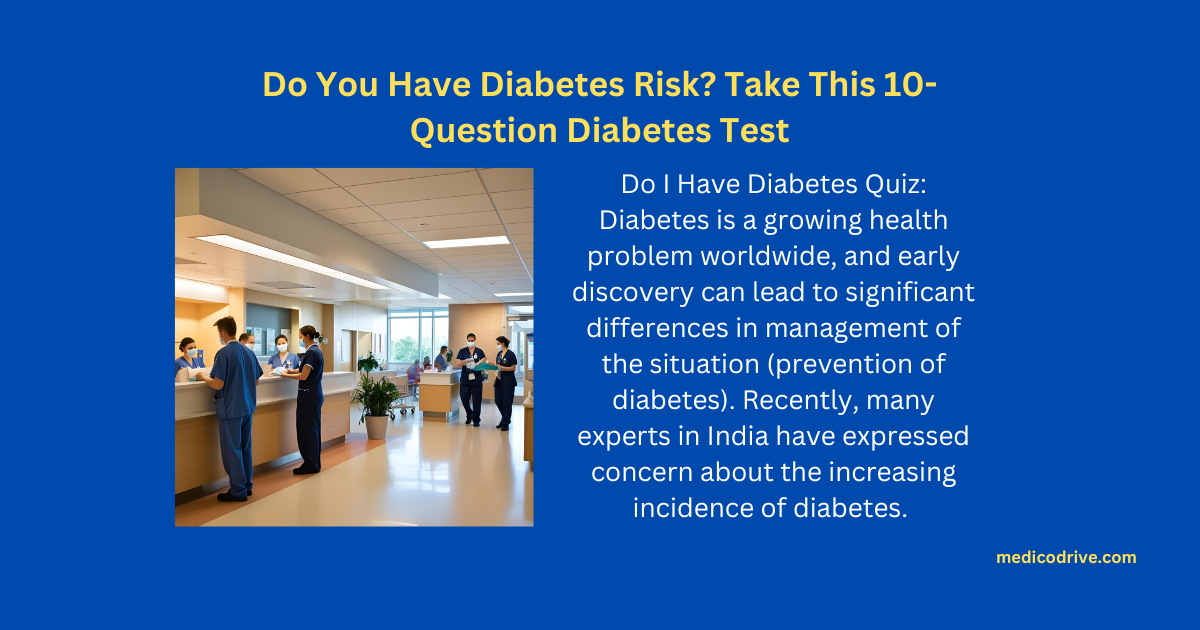Medically Reviewed By Dr Ashish Panwar
Do I Have Diabetes Quiz: Diabetes is a growing health problem worldwide, and early discovery can lead to significant differences in management of the situation (prevention of diabetes). Recently, many experts in India have expressed concern about the increasing incidence of diabetes.

Dr. Anoop Mishra has reported that irregular treatment is a significant obstacle to effective control. Dr. Amrita Ghosh has accused the increasing issues of unhealthy diet and lack of physical activity among young adults. Meanwhile, Dr. Pankaj Soni has described India as the ‘capital of diabetes’, highlighting the role of modern lifestyle and environmental stresses. But how do you want to know that you are at risk? This simple 10 testing can help you assess the risk level.
Diabetes Risk Test
1. Does anyone have in your immediate family diabetes?
Genetics plays an important role in the risk of diabetes. If there is diabetes in a parent or brother -in -law, your risk increases significantly. Family history can contribute to insulin resistance and make it more challenging to regulate blood sugar levels. Source
2. Do you suffer from overweight or overweight?
Further weight, especially around the stomach, is an important risk factor for type 2 diabetes. Intestinal fat increases insulin resistance, making it difficult for your body to treat glucose effectively. Maintaining a healthy weight through proper diet and exercise can significantly reduce the risk.
3. Are you engaged in physical activity less than 30 minutes per day?
A sedentary lifestyle can contribute to insulin resistance, an important factor in the development of diabetes. Regular physical activity improves insulin sensitivity, reduces blood sugar levels and general metabolic health. Even small changes such as daily or stretching can make a difference. Source
4. Do you often feel excessive thirst or dry mouth?
High blood sugar levels can cause dehydration, making you feel consistent thirst. When your body tries to remove excess glucose through urine, it loses water, causing you to dehydrate. Drinking enough fluids and monitoring blood sugar levels can help handle this symptom. Source
5. Do you do more often, especially at night?
Frequent urination is a common symptom of high blood sugar and can indicate an underlying problem. Your kidneys work hard to remove excess sugar from the bloodstream, which increases urination. If this symptom persists, it is important to check by a doctor.
6. Have you focused on unexplained weight loss?
If you lose weight without trying, it may be an indication that your body does not treat glucose properly. When your body cannot use glucose for energy, it begins to break fat and muscles for fuel, causing sudden weight loss. This can be an initial warning signal about diabetes. Source
7. Do you often feel tired or feel sudden energy accidents?
It can be excessive fatigue and lack of energy in unpainted blood sugar levels. When your body fails to transform glucose into energy effectively, you may experience weak, tired or brain fog. Proper food plans and hydration can help handle the energy level. Source
8. Do you have high blood pressure or cholesterol level?
These conditions often occur with diabetes and can increase the risk of complications. High blood pressure and cholesterol levels contribute to heart disease, which is common in diabetic patients. Regular health control and lifestyle changes can help control these risk factors.
9. Do you experience blurry vision?
High blood sugar can affect your vision, which can cause temporary or permanent vision problems. Excessive glucose in the bloodstream can damage the blood vessels in the eyes, which changes the vision. If you notice persistent blur, you can contact an eye specialist.
10. Do you have a slow wound or frequent infection?
Diabetics affect circulation and immune systems, making the wounds difficult to heal. High blood sugar levels slow down the body’s natural healing process, increasing the risk of infection. Proper diabetes treatment can prevent serious complications. Source
Your score: Are you at risk?
0-2 Yes Answer: Low risk. Keep a healthy lifestyle to keep it this way.
3-5 Yes Answer: Medium risk. Consider making lifestyle and testing changes.
6+ Yes Answer: High risk. Contact a health care provider for further evaluation.
Expert insight on Diabetes Risk
Recent studies on evaluation of diabetes risk highlight the importance of initial identity. Dr. Shasikantha SK and colleagues conducted research using Indian Diabetes Risk Score (IDRS) in the countryside, emphasizing that the first lifestyle changes can reduce the risk. Similarly Dr. in young adults. Yogita ji. Bavaskar’s study found that even students have moderate to high risk, and strengthen the need for consciousness. Dr. Abhinav Gangwar’s research provided high IDRS point with high blood sugar levels, which validates the test as an effective screening tool.
What will happen next?
If you have scored in the middle or high-risk movement, it is necessary to take action. Simple lifestyle such as improving your diet, increasing physical activity and monitoring blood sugar levels can occur.
Share This Test!
Encourage your friends and family to take this test too! Early detection and awareness can prevent serious complications.
#DiabetesRisk #HealthQuiz #StayHealthy
Disclaimer: This article is only for informative purposes and should not be regarded as an alternative to professional medical advice. Always consult your doctor for any concern for your health or medical condition.

Hello, I am Dr. Ashish. I have lot of experience in medical field and education, I have gained lot of knowledge in my entrance exam life and medical studies which I want to share with everyone so that I can help more and more people.